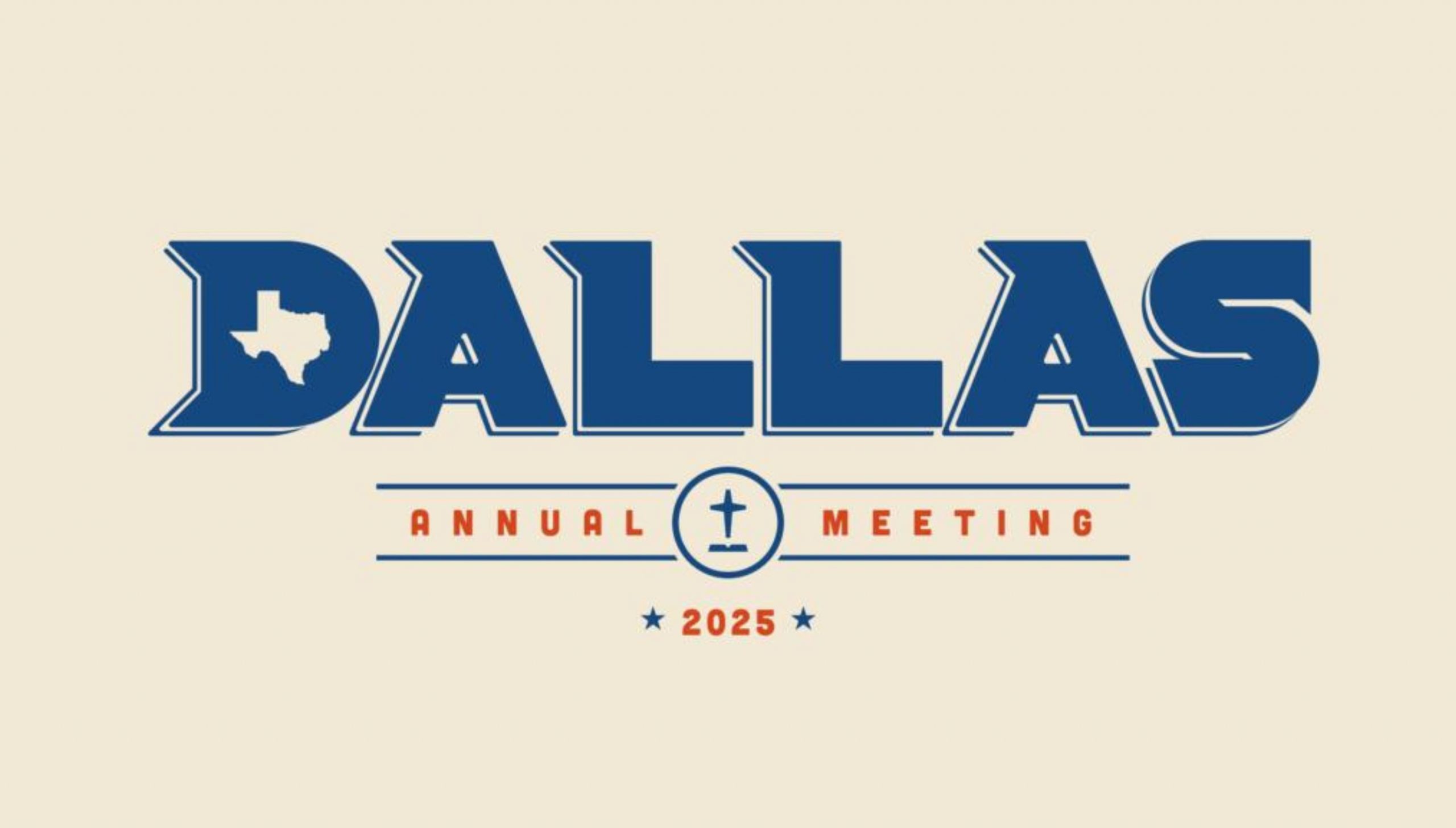
From left, David Dockery, president of SWBTS; Jason Duesing, provost at MBTS; Jamie Dew, president of NOBTS; and Mark Dever, president emeritus of 9Marks and pastor of Capitol Hill Baptist Church in Washington, D.C., speak during Midwestern’s For the Church luncheon on June 10 at the 2025 SBC annual meeting in Dallas. The panel, moderated by MBTS President Jason Allen, also included H.B. Charles, Jr., pastor of Shiloh Metropolitan Baptist Church, and Paul Chitwood, president of the IMB (not pictured).
DALLAS — Nearly 1,400 participants gathered at Midwestern Baptist Theological Seminary’s (MBTS) For the Church Dallas event at the Southern Baptist Convention (SBC) annual meeting to hear convention leaders discuss the 100-year impact of the Southern Baptist confessional statement.
Led by MBTS President Jason Allen, the June 10 event featured panelists Paul Chitwood, Mark Dever, Jason Duesing, David Dockery, Jamie Dew and H.B. Charles, Jr. The discussion began after a time of worship music led by hymn writer and pastor Matt Boswell, who serves as professor of worship ministries at Midwestern Seminary.
Opening the conversation, Allen described the meeting of Southern Baptists in 1925, where messengers of the then 80-year-old convention adopted what would become two defining elements of the convention’s ongoing life and ministry: the Cooperative Program and the Baptist Faith and Message.
David Dockery, president of Southwestern Baptist Theological Seminary (SWBTS), shared the historical challenges leading to the need for a confessional statement.
“In 1845, there was a general consensus of our shared affirmations,” he said, referencing the year the Southern Baptist Convention was formed for the purpose of sending missionaries. Dockery continued, “But by the time we got into the 20th century, liberalism — and particularly naturalism and evolution — was making inroads into Baptist institutions.”
Dockery described how Baptist papers addressed this issue, leading to the formation of the committee that developed and presented a confessional statement at the convention’s 1925 meeting. “It was hardly a unanimous vote, but still an overwhelming majority vote, and the 1925 confession of faith was adopted,” Dockery said.
Jason Duesing, who serves as provost and professor of historical theology at Midwestern Seminary, added, “What happened in 1925 was really a remarkable statement of unity by Southern Baptists.”
He continued, “Southern Baptists in 1925 were doing what Baptists for centuries had been doing, which was saying, ‘Let’s find a way to get together and have common ground doctrinally so that we can go forward to do ministry together, doing something greater than we can do individually.’”
Allen then outlined the events of 1963, when the Baptist Faith and Message was first revised in response to the Elliott controversy, and 2000, when the statement was revised following the conservative resurgence, clarifying doctrines including the truth of Scripture. Allen asked panelists to share the practical importance of the confessional statement in Baptist life and ministry today.
Jamie Dew, president of New Orleans Baptist Theological Seminary (NOBTS), reflected on the impact of the confessional statement in theological education. “As a seminary president, I’m deeply grateful that we have a very clear doctrinal statement,” he said.
He noted how the doctrinal statement enables Southern Baptist seminaries to hire faculty and develop courses that faithfully train students in biblical doctrine. “It gives us the ability to shape a curriculum in a way that’s going to do exactly what the churches of the convention put us there to do.”
H.B. Charles, Jr., pastor-teacher at Shiloh Metropolitan Baptist Church of Jacksonville, Florida, noted the importance of confessionalism for giving church members clarity on their church’s theological convictions.
Charles shared about his experience being called to a church that had no statement of faith, where members were uncertain of the church’s positions in broader societal issues. “Through those conversations, we were able to introduce the Baptist Faith and Message to our church,” Charles said. “The church affirmed it, and it quieted the hearts and minds of our church as they were confident that we were not wavering in truth.”
Paul Chitwood, president of the International Mission Board IMB), noted that confessionalism also ensures the doctrine and practice of the missionaries supported by Southern Baptist churches. “The Baptist Faith and Message is a gift to the IMB because it protects a sacred trust,” he said.
He went on to say, “We’re able to give assurance that the missionaries of the IMB are carrying out their work consistent with the soteriology, ecclesiology and theology of the churches of the Southern Baptist Convention.”
Mark Dever, president emeritus of 9Marks and pastor of Capitol Hill Baptist Church in Washington, D.C., added that when entities have clear doctrinal confessions, they encourage churches to confidently support their efforts in the Great Commission.
“People want to give money to get the gospel around the world.” He continued, “As a local church pastor, I want our dollars to be used well, and we want to get the gospel around the world.”
Concluding the conversation, Allen reflected, “We love serving Southern Baptists. It’s a pleasure and privilege to get to do so, and to do so with theological integrity through the Baptist Faith and Message 2000.”


